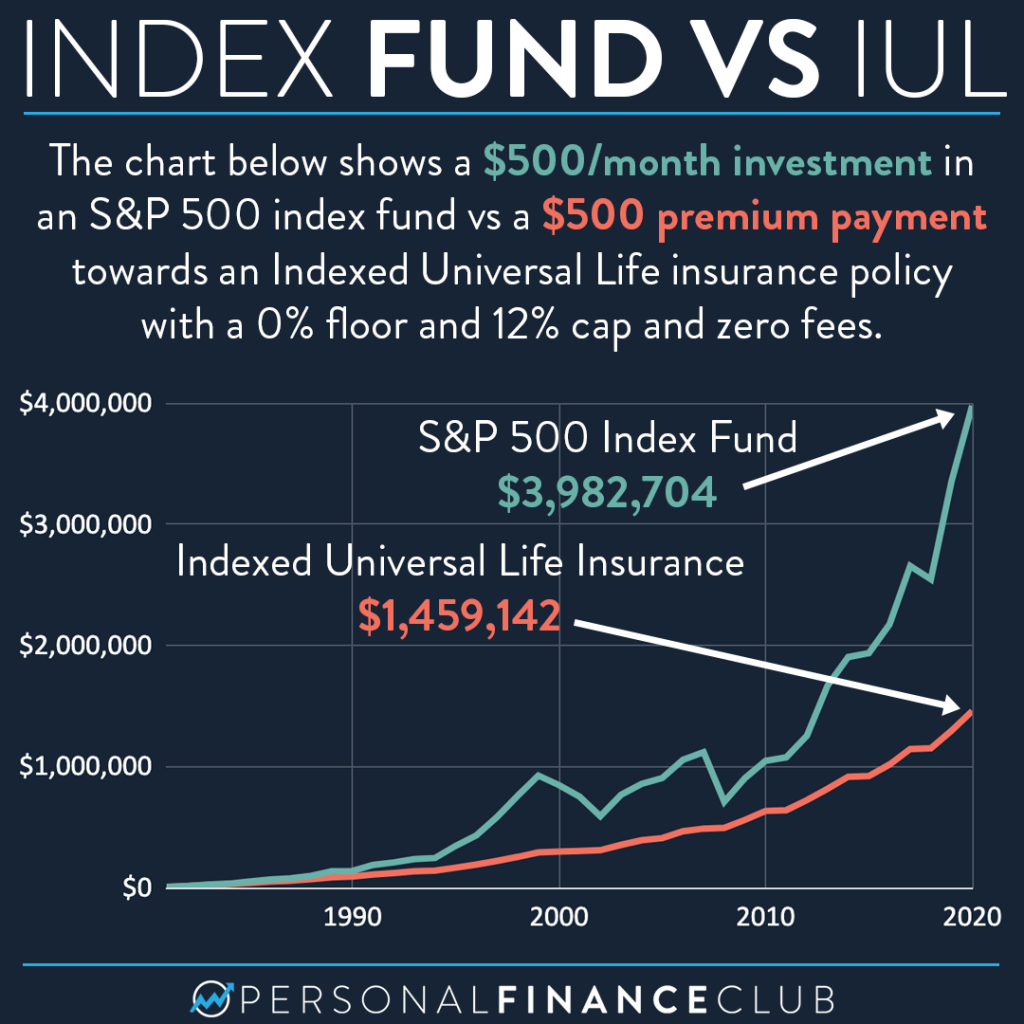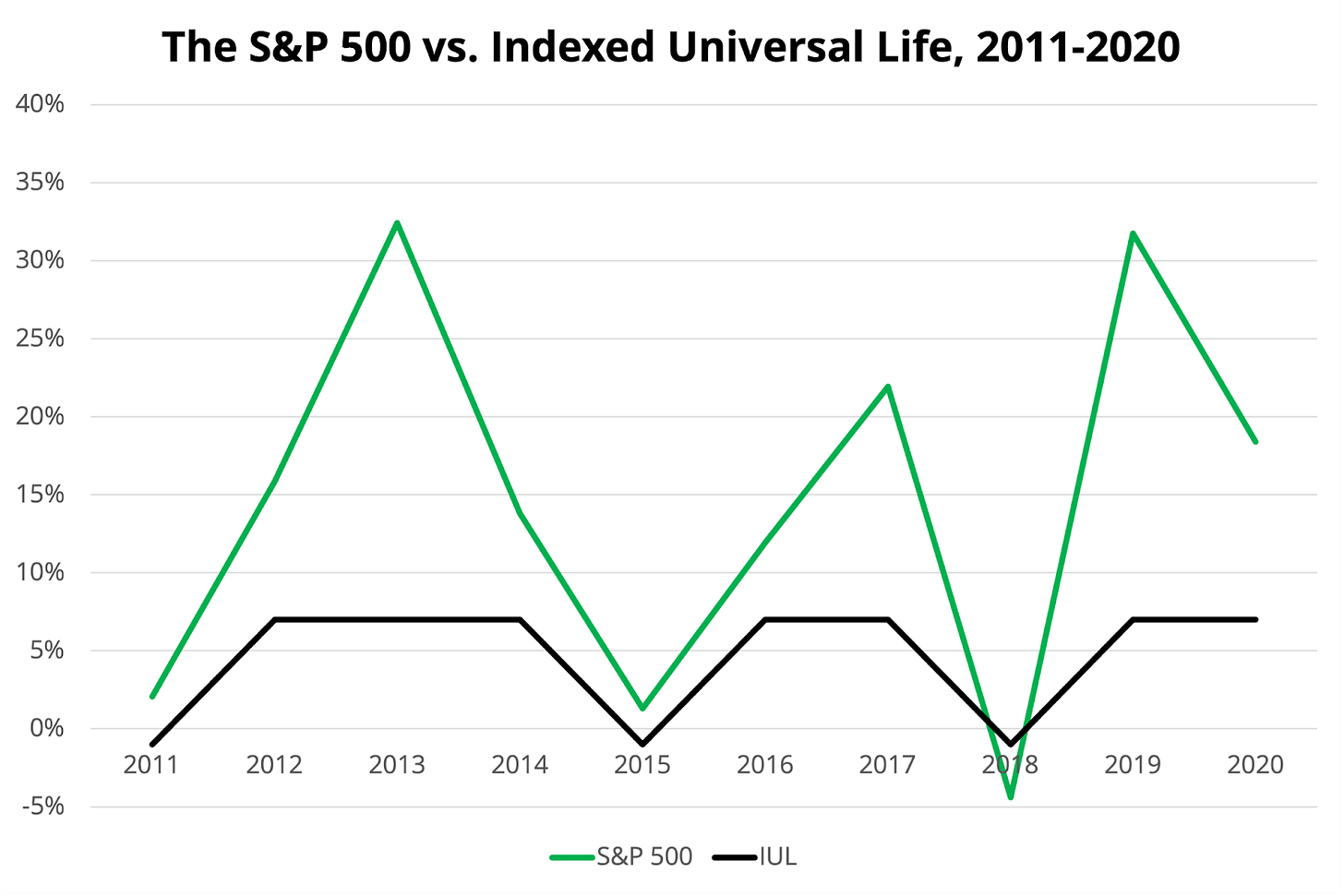All Categories
Featured
Table of Contents
1), usually in an effort to beat their group averages. This is a straw male debate, and one IUL folks love to make. Do they contrast the IUL to something like the Vanguard Total Amount Securities Market Fund Admiral Show to no load, a cost ratio (EMERGENCY ROOM) of 5 basis points, a turn over proportion of 4.3%, and an exceptional tax-efficient document of circulations? No, they compare it to some dreadful actively managed fund with an 8% load, a 2% ER, an 80% turnover ratio, and a terrible document of short-term resources gain circulations.
Common funds often make yearly taxed circulations to fund proprietors, even when the worth of their fund has actually dropped in value. Shared funds not just call for revenue reporting (and the resulting yearly taxes) when the common fund is increasing in value, yet can likewise enforce earnings taxes in a year when the fund has actually dropped in worth.
You can tax-manage the fund, harvesting losses and gains in order to minimize taxed circulations to the investors, however that isn't in some way going to transform the reported return of the fund. The possession of mutual funds may need the mutual fund owner to pay projected taxes (tax free iul).

IULs are simple to position to make sure that, at the proprietor's fatality, the recipient is not subject to either revenue or estate taxes. The same tax obligation reduction strategies do not work almost as well with common funds. There are countless, usually pricey, tax traps related to the moment purchasing and marketing of mutual fund shares, traps that do not apply to indexed life Insurance policy.
Chances aren't really high that you're going to be subject to the AMT due to your mutual fund circulations if you aren't without them. The remainder of this one is half-truths at ideal. While it is true that there is no revenue tax due to your beneficiaries when they acquire the earnings of your IUL plan, it is also true that there is no revenue tax obligation due to your successors when they acquire a mutual fund in a taxed account from you.
Vul Vs Iul
There are better means to avoid estate tax issues than acquiring financial investments with reduced returns. Mutual funds may cause revenue tax of Social Safety advantages.

The growth within the IUL is tax-deferred and may be taken as tax obligation free earnings by means of financings. The policy proprietor (vs. the mutual fund supervisor) is in control of his/her reportable earnings, hence enabling them to lower and even get rid of the tax of their Social Safety benefits. This is terrific.
Below's another marginal issue. It's true if you get a mutual fund for state $10 per share right before the distribution day, and it distributes a $0.50 circulation, you are then mosting likely to owe tax obligations (most likely 7-10 cents per share) although that you haven't yet had any kind of gains.
But ultimately, it's actually about the after-tax return, not just how much you pay in taxes. You are mosting likely to pay even more in taxes by utilizing a taxed account than if you get life insurance policy. Yet you're additionally possibly going to have more cash after paying those taxes. The record-keeping needs for owning common funds are dramatically extra intricate.
With an IUL, one's documents are kept by the insurer, copies of annual declarations are sent by mail to the proprietor, and circulations (if any) are completed and reported at year end. This set is also sort of silly. Certainly you must maintain your tax documents in instance of an audit.
Problems With Indexed Universal Life Insurance
Barely a reason to purchase life insurance policy. Shared funds are commonly component of a decedent's probated estate.
Additionally, they are subject to the hold-ups and expenses of probate. The earnings of the IUL policy, on the various other hand, is constantly a non-probate circulation that passes beyond probate straight to one's named recipients, and is for that reason not subject to one's posthumous creditors, unwanted public disclosure, or comparable hold-ups and costs.
We covered this one under # 7, however just to summarize, if you have a taxable mutual fund account, you need to place it in a revocable count on (or also simpler, make use of the Transfer on Fatality designation) to avoid probate. Medicaid incompetency and lifetime revenue. An IUL can provide their owners with a stream of revenue for their entire life time, no matter of for how long they live.

This is beneficial when arranging one's affairs, and transforming assets to revenue before a retirement home confinement. Mutual funds can not be converted in a comparable fashion, and are generally taken into consideration countable Medicaid assets. This is another foolish one advocating that inadequate people (you know, the ones that need Medicaid, a federal government program for the poor, to spend for their assisted living facility) ought to utilize IUL rather of shared funds.
Linked Life Insurance
And life insurance coverage looks terrible when compared relatively against a retired life account. Second, individuals who have cash to get IUL above and past their pension are going to need to be horrible at handling cash in order to ever before get Medicaid to spend for their retirement home prices.
Chronic and incurable disease motorcyclist. All plans will allow a proprietor's simple access to cash from their plan, usually waiving any type of abandonment penalties when such people endure a major health problem, need at-home treatment, or come to be constrained to a retirement home. Common funds do not provide a similar waiver when contingent deferred sales charges still put on a shared fund account whose proprietor needs to offer some shares to fund the expenses of such a stay.
What Is Group Universal Life
You obtain to pay more for that advantage (cyclist) with an insurance policy. What a good deal! Indexed global life insurance policy supplies fatality advantages to the beneficiaries of the IUL owners, and neither the owner neither the recipient can ever before lose cash as a result of a down market. Common funds give no such guarantees or survivor benefit of any kind of kind.
I absolutely don't need one after I get to economic freedom. Do I desire one? On average, a buyer of life insurance policy pays for the real cost of the life insurance advantage, plus the costs of the policy, plus the revenues of the insurance policy business.
Equity Indexed Universal
I'm not entirely certain why Mr. Morais threw in the entire "you can not shed money" once again right here as it was covered quite well in # 1. He simply wished to duplicate the most effective selling factor for these points I intend. Once again, you don't lose nominal bucks, yet you can shed real bucks, along with face serious opportunity expense because of low returns.

An indexed universal life insurance policy plan owner might trade their policy for a completely different plan without setting off earnings tax obligations. A common fund proprietor can not relocate funds from one common fund business to another without selling his shares at the previous (thus setting off a taxed occasion), and buying brand-new shares at the latter, usually subject to sales costs at both.
While it is real that you can trade one insurance plan for another, the reason that people do this is that the initial one is such a horrible plan that even after acquiring a new one and experiencing the early, negative return years, you'll still appear ahead. If they were offered the right plan the initial time, they shouldn't have any kind of need to ever trade it and go with the early, adverse return years again.
Latest Posts
Indexed Insurance Policy
Growth Life Insurance
Universal Vs Whole Life Comparison